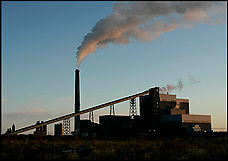
Funny how movements spring from nowhere.
That’s the case with the Waxman-Markey “Cap and Trade” bill to restrict greenhouse gases that I filed about yesterday. There’s no question that the bill has legs given the orgy of lobbying over it that seems to have sprung from nowhere and is supplanting the economic crisis and the still-sizzling financial meltdown.
Why, for example, are right-wing groups suddenly having seminars about Cap and Trade? Why are conservatives such as U.S. Rep Eric Cantor equating the Waxman bill as a threat on the level of global terrorism and Iran? What’s with the timing of the sudden anxiety?
According to the Center for Public Integrity, a group that tracks lobbyists, the renewed interest quietly gained steam in this years first quarter when the business community realized that Barack Obama’s presidency meant that some kind of global warming law was likely. As many as 140 companies started circling their wagons, including makers of blue jeans, computer serves and sneakers. Food firms such as Land O Lakes, Tysons and the National Turkey Federation grabbed sand bags. Other than Duke Energy, whose CEO backs Cap and Trade, many utilities had been quiet but not any more.
The Center lists the “Climate Top 10” of big-time lobbying firms that lead the lobbying pack. Richmond’s very own Hunton & Williams makes the cut with seven power, oil and gas companies.
Right wing advocacy groups, such as the so-called Thomas Jefferson Institute for Public Policy, are setting up seminars to pump out their propaganda about the Waxman bill. Their call to arms is the supposed expense to stop global warming. The Jefferson crowd, which unfortunately was given and has seriously degraded the Bacons Rebellion e-zine, picked three speakers at a recent seminar at the Lewis Ginter Botanical Garden in Richmond who were obviously dogmatically correct and in tune with the institute’s world view which is shaped by the many lobbyists who run the organization.
One speaker claimed that Waxman-Markey would cost the average family $3,000. Funny but the Congressional Budget Office puts the figure at $1,600, but what’s $1,400 when you’re trying to frame an important environmental initiative as needless and costly?
As for Cantor’s concern, consider that for the past four of his election campaigns, Cantor has received money from powerful electric utility Dominion. The firm has given him a total of $88,097, according to the OpenSecrets, a contribution data base, and has been among the top five Cantor donors each time.
To sure sure, lobbyists are springing to action because so much money is at stake with whatever approach goes to cut greenhouse gas emissions. The flurry of activity now means one thing: Waxman-Markey really does have a chance.
Peter Galuszka


